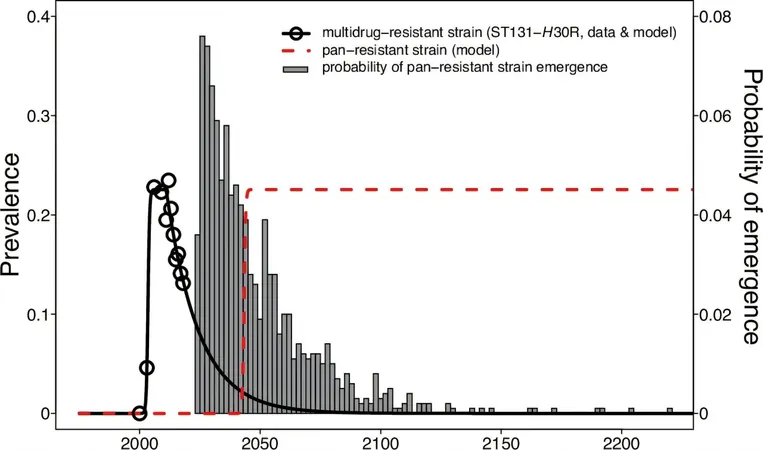
Are We On the Brink of a Public Health Catastrophe? The Alarming Rise of Antibiotic-Resistant Bacteria!
2024-12-27
Author: Daniel
The Alarming Rise of Antibiotic-Resistant Bacteria
The alarming rise of antibiotic-resistant bacteria is setting the stage for a potential public health catastrophe, according to groundbreaking research from Northern Arizona University. The researchers warn that this isn't just a future possibility—it’s a ticking time bomb that could lead to a surge in infection-related fatalities.
A Grim Forecast for Public Health
A recent publication in *Communications Medicine* reveals a grim forecast for public health in the coming decades. With a significant rise in antibiotic usage globally, bacteria are adapting and becoming resistant to many antibiotics—a phenomenon known as multidrug resistance. This trend puts the entire global population at grave risk of succumbing to otherwise treatable infections.
Understanding Pan-Resistance
"While multidrug resistance is concerning, the true horror ensues when a pathogen becomes resistant to all known antibiotics—a situation termed pan-resistance," explained lead author Benjamin Koch, a senior research scientist at NAU's Center for Ecosystem Science and Society (Ecoss). Koch emphasized that this could cause a swift and severe shift in public health challenges. "This research portrays that this issue could escalate exponentially worse than what was anticipated," he cautioned.
Key Collaborators
The research collaboration features insights from renowned experts, including Bruce Hungate, director of Ecoss, and researchers from the Milken Institute School of Public Health at George Washington University and the University of Minnesota.
What Did the Researchers Discover?
The team investigated the potential impact of a hypothetical pan-resistant strain of **E. coli** specifically on sepsis deaths in the United States, employing long-term incidence, mortality rates, and treatment outcome data. Their models predict that sepsis-related fatalities could escalate by an astonishing 18 to 46 times within just five years of such a strain appearing.
The Unpredictable Emergence of Pan-Resistance
While this strain currently doesn't exist, the alarming rate of bacterial evolution towards pan-resistance suggests it could emerge sooner than we think. Koch notes the unpredictable timing—ranging from as soon as one year to as long as a century.
Why This Matters to You!
The rise of pan-resistant bacteria presents a dire threat to all populations, fundamentally altering the landscape of healthcare. Traditionally, individuals in wealthier countries have enjoyed access to superior medical care and a variety of antibiotic treatments. Yet, the rise of pan-resistance diminishes these advantages, potentially leading to increased mortality from infections that were once easily manageable.
Strategic Measures to Combat Resistance
But, it's not all doom and gloom. There are strategic measures that governments, industries, and individuals can adopt to mitigate the risk of rising antibiotic resistance. Authorities can enforce policies that promote safe antibiotic use within agriculture and healthcare, alongside incentivizing the innovation and development of new antibiotic treatments. Moreover, proactive technologies could be deployed to track the emergence and spread of these resistant strains.
Personal Actions to Tackle Antibiotic Resistance
On a personal level, Koch advises that individuals should only use antibiotics when medically necessary and prescribed by healthcare professionals. Supporting policies that enhance antibiotic stewardship is crucial as the pace of new antibiotic development has stagnated in recent years.
A Call to Action
"We must take urgent action to minimize the factors that facilitate the evolution and spread of antibiotic-resistant organisms," the authors assert. "This requires a concerted effort across human and veterinary medicine as well as in the food production industry."
As we face the impending threat of antibiotic resistance, it's imperative that we unite our efforts to combat this global crisis—before it escalates beyond our control! Stay informed and take action—your health may depend on it!


 Brasil (PT)
Brasil (PT)
 Canada (EN)
Canada (EN)
 Chile (ES)
Chile (ES)
 España (ES)
España (ES)
 France (FR)
France (FR)
 Hong Kong (EN)
Hong Kong (EN)
 Italia (IT)
Italia (IT)
 日本 (JA)
日本 (JA)
 Magyarország (HU)
Magyarország (HU)
 Norge (NO)
Norge (NO)
 Polska (PL)
Polska (PL)
 Schweiz (DE)
Schweiz (DE)
 Singapore (EN)
Singapore (EN)
 Sverige (SV)
Sverige (SV)
 Suomi (FI)
Suomi (FI)
 Türkiye (TR)
Türkiye (TR)